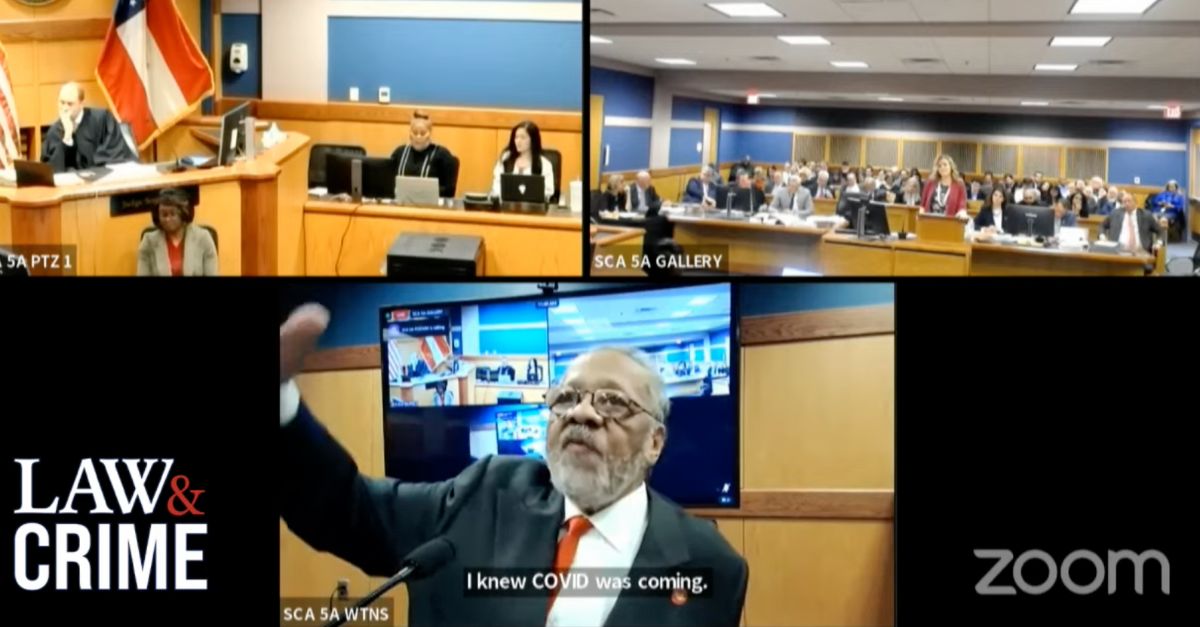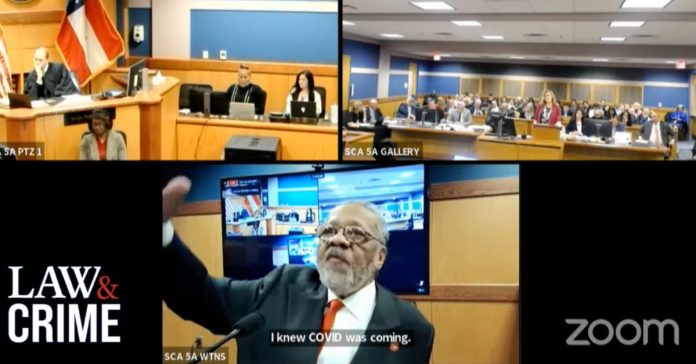
John Floyd, III testifies on Feb. 16 in Fulton County (Law&Crime Network)
Former Georgia governor Roy Barnes was called by the state to testify during a hearing late Friday morning in the racketeering (RICO) and election interference case against Donald Trump and others.
The last Democrat to hold the office in the Peach State, Barnes testified he was asked by Fulton County District Attorney Fani Willis in 2021 to serve as the special prosecutor overseeing the case.
Barnes, who described himself as a trial lawyer whose work only entails trying cases, said he was not prepared to take the cut in pay that would have been concomitant with accepting the appointment.
“I had mouths to feed at a law office,” Barnes told the prosecution. “And that I could not — I would not do that.”
An extensive and extended air of respect and comity prevailed in the court as Barnes testified — fielding compliments and questions from a succession of defense attorneys representing various defendants in the sprawling RICO case against the 45th president.
The atmosphere on Friday was a marked departure from Thursday’s proceedings when Willis took the stand. The district attorney’s testimony was marked by umbrage on her behalf, consistent and often tense needling from various opposing counsel, and even occasional exasperation from the judge overseeing the case.
During one of numerous pauses throughout the day, Fulton County Superior Court Judge Scott McAfee said Georgia attorney Terrence Bradley, the former law partner of special prosecutor Nathan Wade, was in violation of his subpoena. Proceedings were quickly paused Friday as the court waited out Bradley’s doctor’s appointment.
The defense, in a court filing, claims Bradley “will refute” the claim that Willis and Wade “did not have a personal, romantic relationship before Willis appointed Wade as a special prosecutor.”
Willis’s father takes the stand
John Clifford Floyd III, Willis’s father, later took the stand, laughing when he was asked if he was from Atlanta.
“No,” he said. “I grew up in South Central Los Angeles.”
A criminal defense attorney and former member of the Black Panthers who has practiced before the International Criminal Court, Floyd was called by the state to testify about his daughter’s living situation.
The places Willis has called home in recent years have come up as minor flashpoints in the inquiry into allegations she appointed her longtime “boyfriend,” Nathan Wade, as the special prosecutor in the election subversion case. The district attorney’s living situations are important because of disputed claims about if and when Willis and Wade ever “cohabitated.” Additionally, the defense has suggested other cohabitants might have had knowledge about the pair dating.
“I did not meet Nathan Wade until 2023,” Floyd emphatically said in response to the state’s questioning on direct examination.
Another key point during Thursday’s hearing was about financial issues, including Wade’s alleged spending on behalf of Willis.
Defense attorneys have alleged that Willis appointed Wade and then reaped something of a financial windfall in the form of various destination vacations, gift-like dinners and excursions during those trips, and other purchases. The prosecutors, conversely, say they more or less split their travel expenses equally.
There is, however, a very scant — and almost nonexistent — paper trail to substantiate the state’s claims that Willis reimbursed Wade for the numerous domestic and foreign places they visited together. Wade, on Thursday, said he was almost always paid back in cash. Willis, for her part, claims to keep a large amount of cash at all times.
When cross-examined on Friday, Willis’s father was questioned about the so-called “cash horde,” a term used by the defense attorneys.
“It’s a Black thing,” Floyd said, before explaining to attorney that the practice was a result of his experience facing anti-Black bigotry in the U.S.
That lesson was learned, Floyd explained, when he tried to pay for his family’s meal at restaurant in liberal Cambridge, Massachusetts — home to Harvard University — when he worked under a fellowship at the university. Floyd testified the shopkeeper would not accept his American Express card, or his Visa card, or his traveler’s checks — a somewhat antiquated payment instrument akin to a money order and generally considered the equivalent of cash. Floyd did have a $10 bill with him at the time, and the restaurant accepted — would only accept, Floyd said — the cash.
Floyd said he went on to tell his daughter, present for that meal in Massachusetts, when she was still a child: “Always keep some cash.”
Later quizzed as to how he knew about the cash issue by defense attorney Chris Kachouroff, who represents Harrison Floyd (no relation), the former leader of Black Voices for Trump, Willis’s father said he was “prepped by the lawyers and they asked me about it.”
Under cross-examination by defense attorney Ashleigh Merchant, who represents co-defendant Michael Roman, a former staffer for Donald Trump’s 2020 election campaign, Willis’s father said he was aware of his daughter’s testimony from the day before because the case is ubiquitous in the news media and he reads the papers every day.
Merchant went on to move for striking Floyd’s testimony under the court’s rule that witnesses, or potential witnesses, be sequestered and not be aware of the other witnesses’ testimony.
McAfee denied that request but seemed inclined to agree that Willis’s father was in violation of the rule.
“I don’t think the remedy is necessarily striking,” the judge said. “I think it can also go to his credibility as well.”
Have a tip we should know? [email protected]

